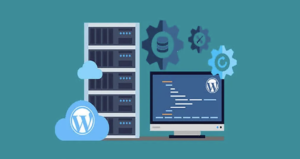As an experienced website owner, I understand the importance of selecting the right web hosting service for your online presence. Your web hosting provider plays a crucial role in the performance, security, and reliability of your website. In this comprehensive guide, I will walk you through the various types of web hosting services, the factors to consider when choosing a provider, and the steps to make an informed decision that meets your specific needs.
Contents
- 1 Introduction to Web Hosting
- 2 Types of Web Hosting Services
- 3 Factors to Consider When Choosing a Web Hosting Service
- 4 Understanding Bandwidth and Storage Options
- 5 Security Features to Look for in a Web Hosting Service
- 6 Evaluating Customer Support and Service Level Agreements
- 7 Comparing Pricing and Plans of Different Web Hosting Providers
- 8 Popular Web Hosting Providers in the Market
- 9 Tips for Migrating Your Website to a New Web Hosting Service
- 10 Conclusion: Making an Informed Decision for Your Web Hosting Needs
Introduction to Web Hosting

Web hosting is the service that allows individuals and businesses to publish their websites on the internet. It involves renting server space and resources from a hosting provider, which ensures that your website is accessible to users around the world. Choosing the right web hosting service is essential for the success and growth of your online business or personal website.
Types of Web Hosting Services
When it comes to web hosting, there are several different types to choose from, each with its own set of features and benefits. Here’s a quick overview of the most common web hosting options:
- Shared Hosting: This is the most affordable and popular type of web hosting, where your website shares server resources with other websites. It’s a cost-effective solution for small to medium-sized websites with moderate traffic.
- Virtual Private Server (VPS) Hosting: VPS hosting provides a more dedicated server environment, where your website is allocated a specific amount of server resources. This offers better performance and scalability compared to shared hosting.
- Dedicated Hosting: In a dedicated hosting plan, you have an entire server dedicated solely to your website. This provides the highest level of control, performance, and customization, but also comes with a higher price tag.
- Cloud Hosting: Cloud hosting distributes your website’s resources across multiple servers, providing scalability, redundancy, and high availability. It’s a flexible and scalable option for growing websites.
- Managed Hosting: Managed hosting services offer a hands-off approach, where the hosting provider handles tasks like server maintenance, software updates, and security. This is ideal for businesses that want to focus on their core operations.
Factors to Consider When Choosing a Web Hosting Service
When selecting a web hosting provider, it’s essential to consider the following factors to ensure you make the best decision for your website:
- Performance and Uptime: Look for a hosting provider with a proven track record of reliable uptime and fast server response times. This will ensure your website loads quickly and remains accessible to your visitors.
- Storage and Bandwidth: Evaluate the storage and bandwidth limits offered by the hosting plan, as these will determine the size and traffic capacity of your website.
- Security Features: Ensure the hosting provider offers robust security measures, such as SSL/TLS certificates, firewalls, and regular backups, to protect your website and your visitors’ data.
- Customer Support: Assess the quality and availability of the hosting provider’s customer support, as you may need assistance with technical issues or website management.
- Scalability: Consider the hosting provider’s ability to accommodate the growth and expansion of your website, whether it’s increasing traffic, adding new features, or expanding your online presence.
- Pricing and Plans: Compare the pricing and plan options offered by different hosting providers to find the best value for your budget and requirements.
- Reputation and Reviews: Research the hosting provider’s reputation in the industry, as well as customer reviews and testimonials, to gauge the quality of their services.
Understanding Bandwidth and Storage Options
Bandwidth and storage are two crucial factors to consider when choosing a web hosting service. Bandwidth refers to the amount of data that can be transferred between your website and your visitors’ devices, while storage is the amount of space available to store your website’s files and content.
When evaluating hosting plans, pay attention to the bandwidth and storage limits, as well as any additional costs for exceeding those limits. It’s important to choose a plan that provides ample resources to accommodate your website’s current and future needs, ensuring a smooth and seamless user experience for your visitors.
Security Features to Look for in a Web Hosting Service
In today’s digital landscape, website security is of paramount importance. When selecting a web hosting provider, be sure to look for the following security features:
- SSL/TLS Certificates: Ensure the hosting provider offers SSL/TLS certificates to encrypt the connection between your website and your visitors’ browsers, protecting sensitive data.
- Firewalls and Malware Scanning: Look for hosting plans that include robust firewalls and regular malware scanning to detect and prevent potential security threats.
- Automated Backups: Reliable and regular backups of your website’s data can be a lifesaver in the event of a system failure or data loss.
- DDoS Protection: Hosting providers with DDoS (Distributed Denial of Service) protection can help safeguard your website from malicious attacks that aim to disrupt its availability.
By prioritizing security features, you can ensure your website and your visitors’ data remain safe and secure.
Evaluating Customer Support and Service Level Agreements
Reliable and responsive customer support is crucial when it comes to web hosting. Look for hosting providers that offer multiple channels of support, such as phone, email, and live chat, with quick response times. Additionally, review the service level agreements (SLAs) to understand the provider’s commitment to uptime, incident resolution, and other service guarantees.
A hosting provider with excellent customer support and clear SLAs can provide peace of mind and ensure that any issues or questions you have are addressed promptly and effectively.
Comparing Pricing and Plans of Different Web Hosting Providers
Web hosting plans can vary significantly in pricing and features, so it’s essential to carefully compare the options available. Consider the following when evaluating hosting plans:
- Upfront Costs: Look at the initial setup fees, domain registration costs, and any other one-time charges.
- Recurring Costs: Examine the monthly or annual fees for the hosting plan, as well as any additional charges for resources or features.
- Scalability: Assess the hosting provider’s ability to accommodate the growth and expansion of your website, including the availability of higher-tier plans.
- Promotional Pricing: Be aware of any introductory or promotional pricing that may revert to a higher rate after the initial contract period.
By thoroughly comparing the pricing and plan options, you can find the most cost-effective web hosting solution that meets your current and future needs.
Popular Web Hosting Providers in the Market
There are numerous web hosting providers in the market, each with its own strengths and specialties. Some of the most popular and well-established options include:
- GoDaddy: A well-known and versatile web hosting provider offering a range of shared, VPS, and dedicated hosting plans.
- Bluehost: A reliable and user-friendly hosting provider, often recommended for beginner website owners.
- HostGator: Known for its affordable shared hosting plans and excellent customer support.
- SiteGround: Offers a variety of hosting solutions with a focus on performance, security, and customer service.
- A2 Hosting: Specializes in high-speed hosting, with a range of shared, VPS, and dedicated server options.
When evaluating these and other hosting providers, be sure to consider the factors discussed earlier, such as performance, security, customer support, and pricing, to find the best fit for your website.
Tips for Migrating Your Website to a New Web Hosting Service
If you’re currently using a web hosting service and need to migrate your website to a new provider, follow these tips to ensure a smooth transition:
- Backup Your Website: Before making any changes, create a complete backup of your website’s files, databases, and other critical data.
- Research and Compare Hosting Providers: Thoroughly research and evaluate potential hosting providers to find the one that best suits your needs.
- Communicate with Your Current Provider: Notify your current hosting provider about your plans to migrate and request any necessary information or assistance.
- Choose a Compatible Hosting Plan: Ensure the new hosting plan you select is compatible with your website’s current setup, including any specific software or technologies you’re using.
- Develop a Migration Plan: Create a step-by-step plan for the migration process, including timelines, testing, and any necessary downtime.
- Test the Migrated Website: Thoroughly test your website on the new hosting platform to ensure everything is functioning correctly before going live.
- Update Your DNS Settings: Once the migration is complete, update your domain’s DNS settings to point to the new hosting provider.
By following these tips, you can successfully migrate your website to a new hosting service with minimal disruption to your online presence.
Conclusion: Making an Informed Decision for Your Web Hosting Needs
Choosing the right web hosting service is a crucial decision that can have a significant impact on the success and performance of your website. By considering the factors outlined in this guide, such as performance, security, customer support, and pricing, you can make an informed decision that aligns with your specific needs and goals.
Remember, your web hosting provider is a critical partner in your online success, so take the time to research and evaluate your options thoroughly. With the right hosting solution in place, you can focus on growing your website and delivering an exceptional experience for your visitors.
